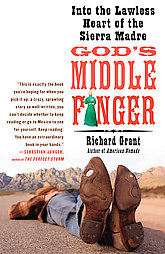"God's Middle Finger" is not a book about drug policy. It's not really even a book about drugs; it belongs to the travel literature genre. But if you're interested in drugs, drug production, and drug policy, especially when it comes to the Mexican drug trade, this is a book you'll want to read.

If you stand on the US-Mexican border at someplace like Douglas, Arizona, or Columbus, New Mexico, you can see the northern end of the Sierra Madre just a few miles to the south. From there, the massive, rugged range -- with peaks up to 11,000 feet -- extends nearly 900 miles to the south, cutting through the Mexican states of Chihuahua, Sonora, Nayarit, Sinaloa, and Durango in a series of massifs carved by spectacular and not easily traversable canyons. Historically the home of outlaws, hermits, cowboys, and renegade Indians (surviving bands of Apache were hiding out there as late as the 1930s, Grant reports), the contemporary Sierra Madre is now the haunt of outcasts, cave-dwelling Tarahumara Indians, Mormons, opium growers, pot farmers, vicious narcos, and -- every once in awhile -- marauding Mexican soldiers and police.
These days, the treasure of the Sierra Madre isn't gold, but the drug crops that grow there, and nobody needs any stinking badges. Or, even if they're wearing badges, it doesn't seem to make much difference. In one tale, Grant relates an evening in a bar in a mountain town where two lip-twitching, beer-swilling local cops insist he buy them caguamas (40 ouncers) of beer and share their cocaine, or perico (parakeet, because it makes you chatter like one). "Call me paranoid," Grant wrote, "but the idea of doing cocaine with Mexican cops makes me nervous." But given the alternative -- pissing off a pair of coked-out, half-drunk cops who would be mightily insulted in he turned down their offer -- Grant joined them in snorting lines off the table until, luckily for him, his money ran out and he could make his escape.
(I had a similar experience with a coke-shooting cop in a small town in Veracruz back in the mid-1990s. It was at that point that I began to understand that some of the cocaine diverted from the Caribbean smuggling route after a Reaganite crackdown in the mid-1980s and now flowing north through Mexico was "falling off the back of the truck." You didn't used to see a whole lot of cocaine in Mexico, and you certainly didn't run into coked-out cops. My, how things have changed!)
Grant writes that he was warned repeatedly not to travel the Sierra Madre, that he was likely to be killed if he traveled by himself. But, obsessed by those mountains, he went anyway, usually relying on local contacts to keep him safe. It didn't always work. The prologue to "God's Middle Finger" has him fleeing for his life on foot through the mountains at night, chased by drunken, coked-out narcos apparently ready to kill him for the sport of it. On another occasion, Grant tells about how he ruined his vehicle's motor after being forced at gunpoint to tow the broken-down car of some strangers up a mountain pass.
Grant has a great flair for story-telling and introduces the reader to a whole ensemble of vivid characters and local histories, but his love for the Sierra Madre curdles a bit when faced with the violent, rapacious realities of the lawless life. Private gun ownership is forbidden in Mexico, but as one of his informants tells him, every home has at least a shot gun and a pistol, and AK-47s are a badge of macho honor. Murder is common in the region, so is rape, and so is revenge killing. Mix in a hyper-violent population of narcos hopped up on blow and booze, and the stark beauty of the Sierra Madre gets pretty damned ugly and scary.
As Grant puts it: "What you had, in other words, was a hillbilly vendetta culture that was up to its eyeballs in the world's most dangerous business: illegal narcotics. Its existing tendencies toward violence, vengeance, and ruthlessness had become supercharged."
So supercharged that Grant, sick of the fear and tension and the macho posturing, cut short his trip about half-way down the cordillera. Prudence and revulsion may have won out over obsession, but with "God's Middle Finger," Grant provides a highly memorable set of glimpses into the mountain heartlands of some of Mexico's meanest narcos.
"God's Middle Finger" is fast-paced, full of intriguing detail and strange doings. Reading it is going to make you want to follow in Grant's footsteps... or run just as fast as you can in the other direction. In either case, you'll have had a fascinating education into a strange but not so distant world inextricably linked to our own through our appetites for some of the products it produces.
This work by StoptheDrugWar.org is licensed under Creative Commons Attribution-ShareAlike 4.0 International
Comments
Gods Middle Finger
Been there and done it (I made the complete north to south transit of the Western Sierra Madres of Mexico) in the late 70's. There is much to be learned from comparing free Mexicans to opressed/persecuted Americans (citizens of USA, Canada, & coastal Mexico). Earth's free people choose to live beyond the reach of "Big Brother", and it was refreshing to learn from the author's observations that there are still a few patriots fighting for freedom in the mountains of Mexico. cddjr
Add new comment